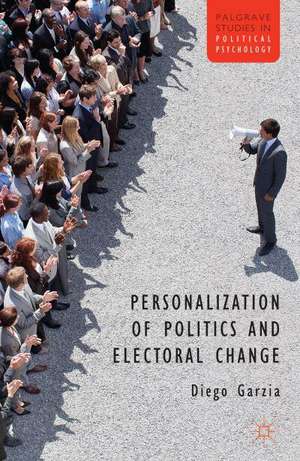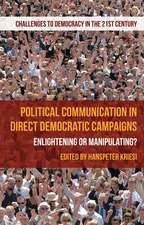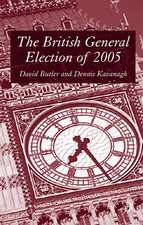Personalization of Politics and Electoral Change: Palgrave Studies in Political Psychology
Autor D. Garziaen Limba Engleză Hardback – 17 ian 2014
Preț: 636.80 lei
Preț vechi: 749.19 lei
-15% Nou
Puncte Express: 955
Preț estimativ în valută:
121.85€ • 126.97$ • 100.89£
121.85€ • 126.97$ • 100.89£
Carte tipărită la comandă
Livrare economică 03-17 aprilie
Preluare comenzi: 021 569.72.76
Specificații
ISBN-13: 9781137270221
ISBN-10: 1137270225
Pagini: 137
Ilustrații: X, 137 p.
Dimensiuni: 140 x 216 x 17 mm
Greutate: 0.32 kg
Ediția:2014
Editura: Palgrave Macmillan UK
Colecția Palgrave Macmillan
Seria Palgrave Studies in Political Psychology
Locul publicării:London, United Kingdom
ISBN-10: 1137270225
Pagini: 137
Ilustrații: X, 137 p.
Dimensiuni: 140 x 216 x 17 mm
Greutate: 0.32 kg
Ediția:2014
Editura: Palgrave Macmillan UK
Colecția Palgrave Macmillan
Seria Palgrave Studies in Political Psychology
Locul publicării:London, United Kingdom
Cuprins
1. Introduction 2. The Personalization of Politics 3. The Attitudinal Consequences of the Personalization of Politics 4. The Behavioral Consequences of the Personalization of Politics 5. The Electoral Consequences of the Personalization of Politics 6. Normative and Emprical Implications of the Personalization of Politics
Recenzii
"This elegant and compelling comparative study greatly enhances our understanding of leader effects in parliamentary elections. Systematically analyzing the impact of leader evaluations on partisanship as well as the vote, it shows that leaders matter, and matter increasingly, for the way individuals vote and, often, the way elections turn out."
Anthony Mughan, Professor and Director of International Studies, Department of Political Science, Ohio State University, USA
"Has the personality of political leaders become more important? Dr. Garzia gives an affirmative reply. He shows that the tug of political parties and social structures has lessened, so allowing leaders more freedom in the electoral arena. As examples, he chooses three different parliamentary democracies - Britain, Germany, The Netherlands. The book seems a natural choice for students and scholars looking for an engaging work on the political psychology of leaders in a comparative elections context."
Michael S. Lewis-Beck, F. Wendell Miller Distinguished Professor of Political Science, University of Iowa, USA
'At last, leader personalization is proved to be a key component of partisanship in Western Europe and electoral behaviour research has to give political psychology the fundamental place it deserves!'
Jean Blondel, Emeritus Professor, Robert Schumann Centre for Advanced Studies, European University Institute, Italy
Anthony Mughan, Professor and Director of International Studies, Department of Political Science, Ohio State University, USA
"Has the personality of political leaders become more important? Dr. Garzia gives an affirmative reply. He shows that the tug of political parties and social structures has lessened, so allowing leaders more freedom in the electoral arena. As examples, he chooses three different parliamentary democracies - Britain, Germany, The Netherlands. The book seems a natural choice for students and scholars looking for an engaging work on the political psychology of leaders in a comparative elections context."
Michael S. Lewis-Beck, F. Wendell Miller Distinguished Professor of Political Science, University of Iowa, USA
'At last, leader personalization is proved to be a key component of partisanship in Western Europe and electoral behaviour research has to give political psychology the fundamental place it deserves!'
Jean Blondel, Emeritus Professor, Robert Schumann Centre for Advanced Studies, European University Institute, Italy
Notă biografică
Dr. Diego Garzia is Jean Monnet Fellow at the European University Institute, Florence, Italy. He has authored over 60 academic publications and professional reports including articles in journals such as Electoral Studies, Political Psychology, Party Politics, Political Research Quarterly and West European Politics. He is member of the Italian National Election Study (ITANES).




















